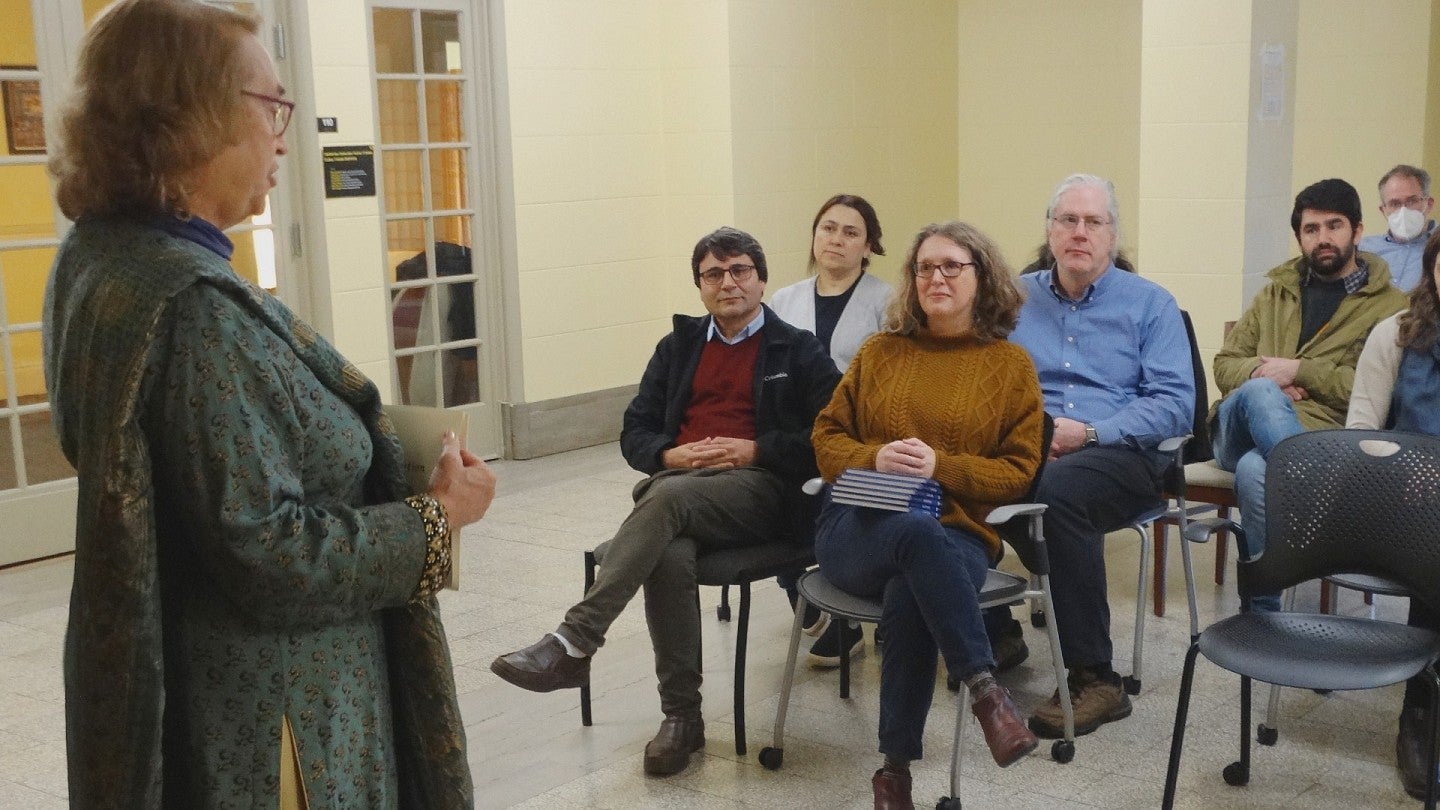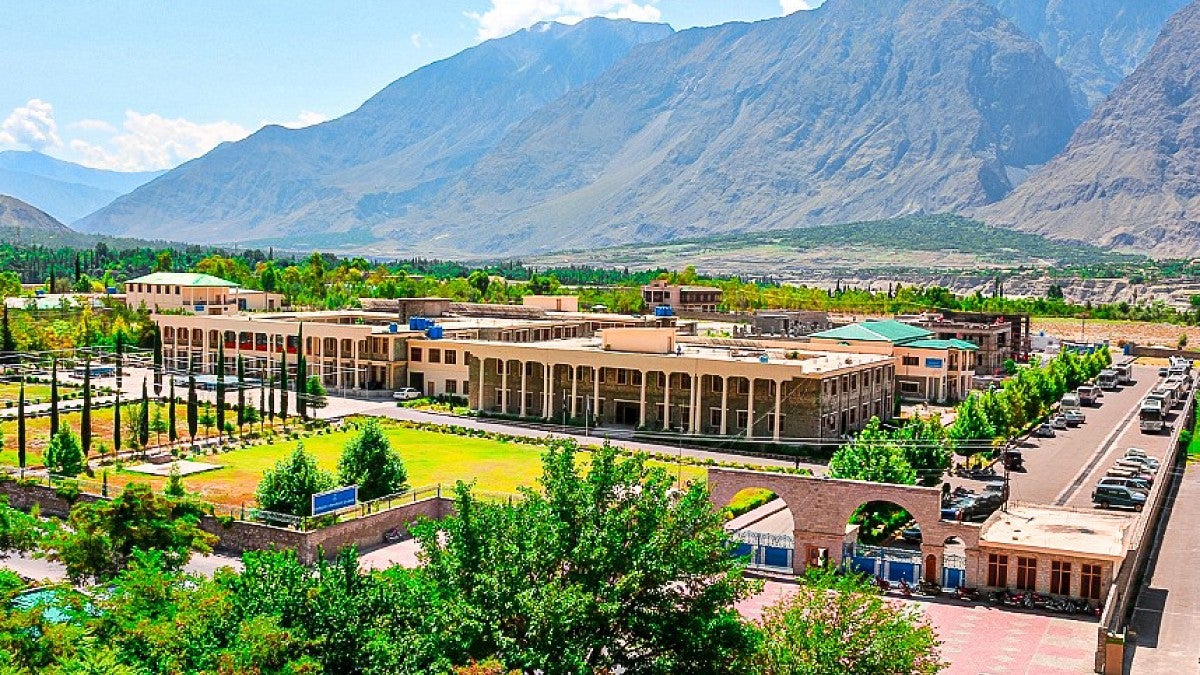Eugene, home to the University of Oregon, is literally half a world away — about 6,800 miles as the crow flies — from Gilgit, Pakistan, where Karakoram International University is located.
Scholars from the two universities have spanned that global gap, most recently when six faculty members from KIU spent two months this winter at the UO with a shared goal of confronting climate change through research and enhancing teaching.
The exchange is being led by Anita Weiss, a professor of global studies who has written eight books on Pakistan, and Mark Carey, a professor of environmental studies and geography, who Weiss enlisted to help with the project because of his expertise, especially with the UO faculty advisory committee. Both are part of the UO’s College of Arts and Sciences.
The exchange is supported by a two-year, $500,000 grant from the U.S. State Department, administered by Holly Lakey, assistant director of the UO Center for Asian and Pacific Studies. A second contingent of KIU scholars is expected to visit the UO in January 2024.

The UO-KIU partnership dates back a decade. Weiss wrote the initial proposal for an exchange with KIU through the university partnership program to prioritize environmental studies and business management, especially entrepreneurship. Starting in 2014, more than two dozen KIU faculty members have come to the UO through the partnership programs, with each having a UO faculty mentor.
The current project launched last September, when Weiss traveled to Gilgit with Dan Gavin, professor of geography at the UO, to meet KIU faculty members who had been selected for the exchange, to pair them with UO mentors and to share their knowledge and expertise as they viewed the high glaciers in the region.
The KIU faculty members arrived at the UO in January and had weekly meetings with a mentor and explored avenues for collaborative research. KIU faculty also audited courses at the UO to help them expand their own courses back in Gilgit. They took field trips, including to the Oregon Coast, the Cascades and the Columbia Gorge.
Carey, who leads the Glacier Lab for the Study of Ice and Society, said the exchange had both a teaching component and a research component. The KIU faculty members want to improve their classes related to climate change and to teach more classes around glaciology and glacial hazards. The result was conversations about syllabi, how to teach and what to teach, he said.
“It was an exchange of ideas,” Carey said. “I teach on glacier hazards, and I was learning a lot from them on what’s going on in Pakistan.”
In addition, UO and KIU faculty explored avenues for doing collaborative research. Carey and Karamat Ali, an assistant professor of environmental studies at KIU, have drafted a chapter for an upcoming book on the social dimensions of glacial hazards.
Gilgit sits in a valley at nearly 5,000 feet in elevation in the shadow of three great mountain ranges: the Himalayas, the Karakoram and the Hindu Kush.
“It’s at the top of the world,” Weiss said.
The partnership will help communities in the Gilgit-Baltistan region better prepare for and respond to the environmental and climate hazards they face, Weiss and Carey said. The region has been hit with climate dangers such as glacial melting and extreme weather events such as flooding and rockslides. Those same threats are confronting alpine regions around the globe, from the Andes to the Alps to the Arctic.
Zafar Khan, chair of KIU’s Department of Forestry, Range, and Wildlife Management, expects KIU faculty members will develop new courses on climate change and glaciology as a result of the latest exchange. In addition, he expects faculty members from the universities to develop joint research projects. That will all contribute to KIU’s new Center for Glaciology and Cryosphere Studies.
Carey said the exchange program helps support the guiding principles of the UO’s Environment Initiative.
“The UO-KIU collaboration involves transdisciplinary work that centers student needs through curricular innovation, is responsive to community needs in Pakistan, is policy relevant, and foregrounds the issues of inequity to help pursue climate justice,” Carey said.
Climate change problems are happening all over the world, Carey said, and understanding them in specific context “is crucial for us as researchers and crucial for students to understand.”
The KIU faculty aren’t the only ones who benefit, Carey said.
“It’s important for us at the UO to be collaborating internationally,” he said. “Anytime we diversify research teams, bringing in BIPOC or early career or international researchers, we do better work and better scholarship.”
—By Tim Christie, University Communication
—Top photo: Karakoram International University in Gilgit, Pakistan


